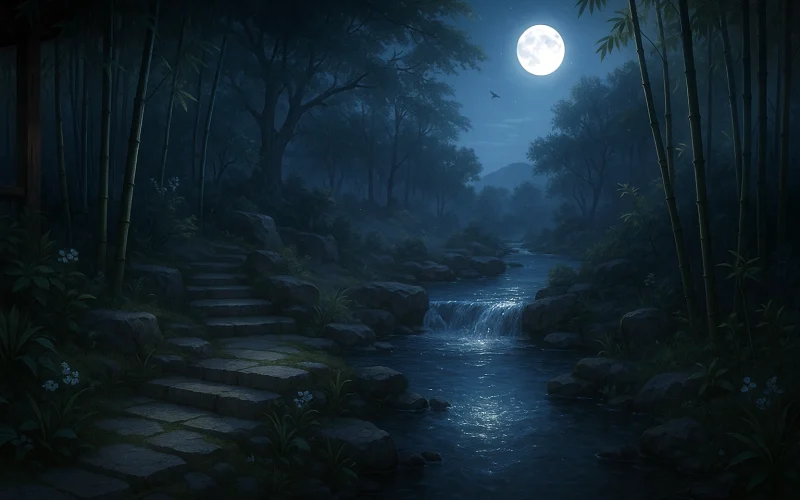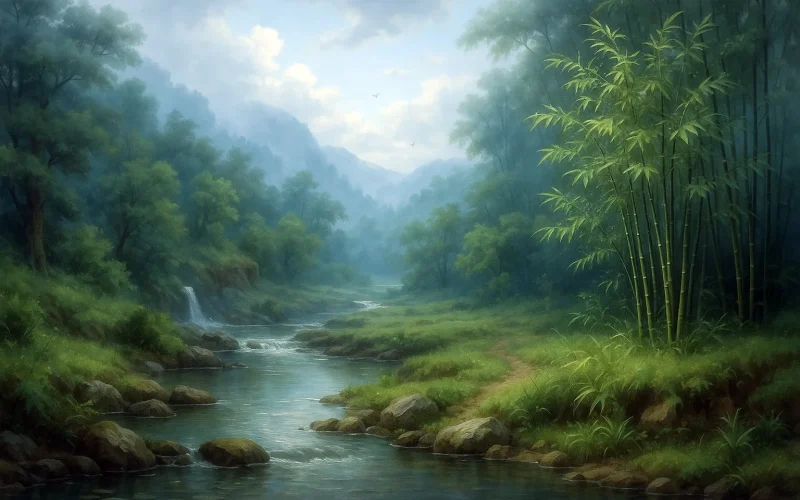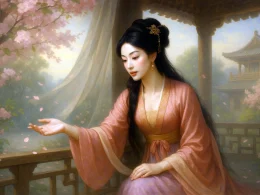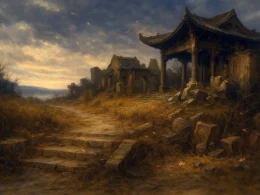I wake to dripping dew's clear knell,
Open doors to west garden's spell.
Cold moon climbs the eastern height,
Through sparse bamboo shafts spills light.
Distant stone springs sing more clear,
Mountain birds cry—then disappear.
Leaning on pillars till dawn's hue,
What can silence say to you?
Original Poem
「中夜起望西园值月上」
柳宗元
觉闻繁露坠,开户临西园。
寒月上东岭,泠泠疏竹根。
石泉远逾响,山鸟时一喧。
倚楹遂至旦,寂寞将何言。
Interpretation
This poem was composed in the fifth year of the Yuanhe era (810 AD), the sixth year of Liu Zongyuan's exile in Yongzhou. That year, he purchased land west of the Xiao River, personally cleared and built a dwelling, renamed Ranxi as "Fool's Creek," and styled himself "Master of Fool's Creek." On the surface, he had gradually adapted to life in exile—farming, reading, and supporting himself amidst the mountains, rivers, and fields, seemingly finding a spiritual refuge. However, this superficial contentment with the landscape could not truly dissolve the inner resentment and indignation. The poem depicts precisely such a night—the poet awakens from a dream, unable to sleep again, so he opens the door and walks to the West Garden, standing alone under the moonlight until dawn. The faint sound of "dense dew falling," the distant, clear sound of the spring, the occasional startling cry of a mountain bird—all highlight the night's silence and, in turn, accentuate the poet's inner loneliness and wakefulness.
This loneliness is not the transcendent solitude of a recluse, but the inexpressible desolation of an outcast—his body is amidst the mountains and waters, but his heart remains tied to a world he can no longer return to. The entire poem uses the most minimal brushstrokes to depict profound emotion, a classic example of the "clear, cold, and solitary" style in Liu Zongyuan's Yongzhou poetry.
First Couplet: "觉闻繁露坠,开户临西园。"
Jué wén fán lù zhuì, kāi hù lín xī yuán.
Waking, I heard dense dew falling; I opened the door, faced the West Garden.
The opening uses a minute sound to convey the ultimate stillness of the night. "Waking, I heard dense dew falling"—the sound of dripping dew is extremely faint; only in the profound silence of deep night can the human ear catch it. That the poet can hear this sound indicates he has awakened from a dream and that the night is so quiet one can hear everything. The word "dense" suggests both the abundance of dew and, implicitly, the passage of time—dew condensing and dripping is a process; the poet has been awake for a while to hear this continuous sound of "dense dew falling." "I opened the door, faced the West Garden" describes his action upon waking. Pushing open the door, he walks towards the West Garden. This seemingly ordinary step draws him from indoors into the broader night and from dreams into a more wakeful loneliness. The word "faced" carries a sense of confronting, gazing; he prepares himself for a long contemplation of this pure, cold night.
Second Couplet: "寒月上东岭,泠泠疏竹根。"
Hán yuè shàng dōng lǐng, líng líng shū zhú gēn.
The chill moon climbed the eastern hill; by sparse bamboo roots, a crystalline clarity.
This couplet describes the moonrise scene and the sound under the moonlight. "The chill moon climbed the eastern hill"—the word "chill" refers both to the coldness of the moonlight and the chill in the poet's heart. The moon is the same moon, but in the eyes of the dejected, it is always "chill." "By sparse bamboo roots, a crystalline clarity" continues the auditory experience—water flows by the bamboo roots, making a clear, crystalline sound. This sound is pure, distant, as clear and cold as the moonlight, as solitary as the poet's state of mind. Sight and sound converge here: the moon is chill, the water sound crystalline, the bamboo sparse—everything points to a clear, cold, secluded artistic conception. The poet merges himself into this conception, or rather, this conception is an externalization of the poet's inner world.
Third Couplet: "石泉远逾响,山鸟时一喧。"
Shí quán yuǎn yú xiǎng, shān niǎo shí yī xuān.
The rock spring, far off, sounded all the clearer; a mountain bird at times shattered the stillness.
This couplet uses changes in sound to further render the depth of the night. "The rock spring, far off, sounded all the clearer"—the spring is distant, but because the night is so still, its originally faint sound appears exceptionally clear. The three words "sounded all the clearer" wonderfully capture the subtlety of hearing: it is not that the spring's sound has grown louder, but the night's silence makes it seem so. This uses sound to write silence; the more distant sounds one hears, the more it proves the silence of the surroundings. "A mountain bird at times shattered the stillness" is an occasional startling cry. Perhaps disturbed by the moonlight, perhaps crying out in a dream. This one cry of "shattered" briefly breaks the night's stillness, yet makes the stillness seem even deeper after the sound fades. Just as Wang Ji's line "A bird's cry makes the mountain seem more secluded" uses sound to highlight quiet, Liu Zongyuan here uses "at times shattered" to set off the "utter silence," achieving a similar effect through different means.
Fourth Couplet: "倚楹遂至旦,寂寞将何言。"
Yǐ yíng suì zhì dàn, jì mò jiāng hé yán.
Leaning on the pillar, I stayed until dawn; In this loneliness, what is there to say?
The final couplet concludes the poem, condensing all the preceding scenes and moods into a wordless sigh. "Leaning on the pillar, I stayed until dawn"—he leaned against the pillar, standing from midnight until daybreak. Throughout that long time, he did not return to sleep, did not do anything, just stood, watched, listened. This image itself is the ultimate portrayal of loneliness. "In this loneliness, what is there to say?"—five words that say everything. When loneliness reaches its peak, there are, instead, no words. It is not that there is nothing to say, but that there is too much, not knowing where to begin; too much, and saying it is useless; too much, that it can only be swallowed back into the heart. This pain of "wordlessness" is deeper than any outpouring. The poet ends with "what is there to say," letting the entire poem close in a blanket of silence, its lingering resonance long and evocative, leaving one in contemplation.
Holistic Appreciation
This ancient-style pentasyllabic poem begins with "waking at midnight" and concludes with "leaning on the pillar until dawn," completing a soliloquy of the soul through the passage of time. The first two couplets describe waking, going out, seeing the moon, hearing the water—the unfolding of perception. The third couplet uses "sounded all the clearer" and "at times shattered" to depict the depth of the night—a deepening of perception. The final couplet uses "leaning on the pillar… until dawn" and "loneliness… what is there to say" to describe the sedimentation of mood—the condensation of emotion.
The entire poem uses sound to depict silence—dew falling, spring sounding, bird crying out; all sounds serve to set off the night's silence. It uses scene to convey feeling—the chill moon, sparse bamboo, rock spring; all scenes are projections of the poet's inner world. Liu Zongyuan does not directly say "I am lonely," but every word speaks of loneliness; he does not directly say "I am in pain," but every line speaks of pain. This subtle, profound technique is precisely the unique charm of Liu Zongyuan's poetry.
Artistic Merits
- Using Sound to Depict Silence, Movement and Stillness Intertwined: The sounds of dew falling, spring sounding, and bird crying progress layer by layer, together highlighting the ultimate stillness of the night—a masterful technique.
- Scene and Feeling Fused, Object and Self as One: The chill moon, sparse bamboo, rock spring are both scenes before the eyes and feelings within the heart; scene and feeling are seamlessly blended, inseparable.
- Simple, Plain Language, Profound Meaning: The poem contains no obscure or difficult phrases; it is as plain as everyday speech, yet contains endless sorrowful thought, embodying Liu Zongyuan's artistic style of "pure, austere, and subtly distant."
- Subtle Ending, Lingering Resonance: The five words "In this loneliness, what is there to say" conclude the entire poem with wordlessness, yet let the reader feel a thousand words left unsaid, the aftertaste infinite.
Insights
This poem first enlightens us on how to coexist with loneliness. In the sixth year of his exile, Liu Zongyuan would still wake in the deep night, still be enveloped by boundless loneliness. But he did not escape this solitude; instead, he opened the door and walked to the West Garden, standing quietly facing loneliness under the moonlight, amidst the spring's sound, the bird's cry, until dawn. This attitude of not escaping, not sinking, but directly confronting loneliness, coexisting with it, is itself a form of spiritual strength. It tells us: loneliness is not terrifying; what is terrifying is not daring to face it. Learning to coexist with loneliness is learning to coexist with oneself.
The subtle experience of "The rock spring, far off, sounded all the clearer" in the poem also makes us contemplate the depth of perception and the sensitivity of the soul. In the silent depth of night, the poet could hear the distant spring, could hear the dew dripping. This keen perceptiveness stems from both the night's silence and the poet's inner sensitivity. It is precisely this sensitivity that allows him, despite the hardship of exile, to maintain a delicate observation of the world, to still distill poetry from ordinary scenes. Sensitivity is not a weakness but a way to connect deeply with the world—it makes us bear more pain, but also experience more beauty.
The wordless pain captured in "In this loneliness, what is there to say" also prompts us to reflect on the limits of language. Some emotions simply cannot be articulated; some pains, once spoken, risk being diminished. Liu Zongyuan's choice to end with "wordlessness" is precisely an acknowledgment of—and a tribute to—this ineffable sorrow. It offers a quiet insight: Not every feeling demands expression; not every pain needs telling. Sometimes, silence carries more weight than words, and wordlessness brings us closer to truth than any outpouring ever could.
Finally, the image of that figure "leaning on the pillar, I stayed until dawn" is especially moving. From midnight to dawn, he remained there, leaning against the pillar, motionless. This prolonged standing is a physical stillness and a mental contemplation. In today's fast-paced world, we rarely have such moments—doing nothing, just standing, watching, thinking. Liu Zongyuan's poem reminds us: Life needs such moments. We need to stop, let ourselves be immersed in silence, and face our own hearts. Only in such moments can we truly hear the sound of "dense dew falling," can we hear the truest voice deep within.
About the Poet
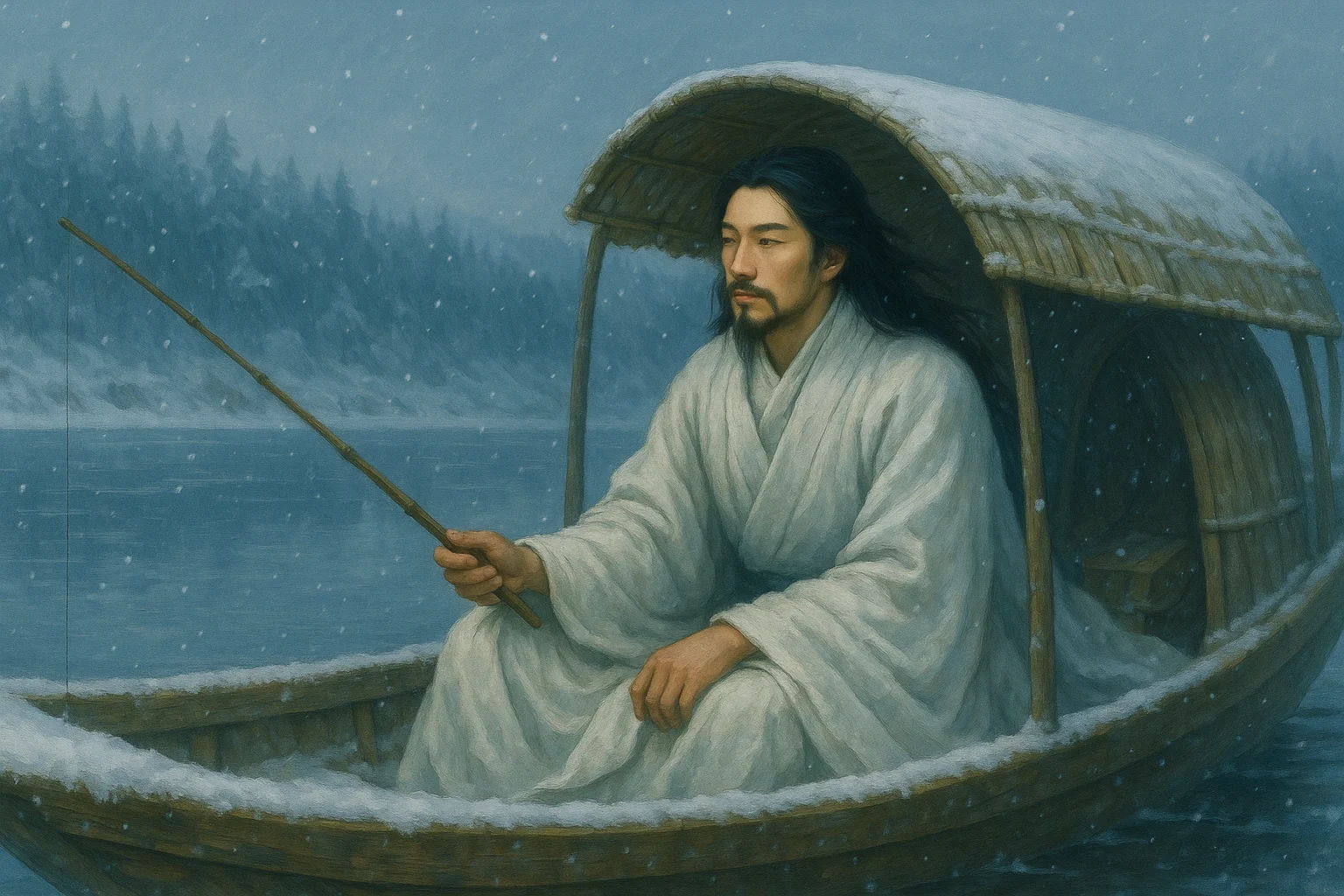
Liu Zongyuan (柳宗元, 773 - 819), a native of Yuncheng in Shanxi province, was a pioneering advocate of the Classical Prose Movement during China's Tang Dynasty. Awarded the prestigious jinshi degree in 793 during the Zhenyuan era, this distinguished scholar-official revolutionized Chinese literature with his groundbreaking essays. His prose works, remarkable for their incisive vigor and crystalline purity, established the canonical model for landscape travel writing that would influence generations. As a poet, Liu mastered a distinctive style of luminous clarity and solitary grandeur, securing his place among the legendary "Eight Great Masters of Tang-Song Prose" - an honor reflecting his enduring impact on Chinese literary history.






